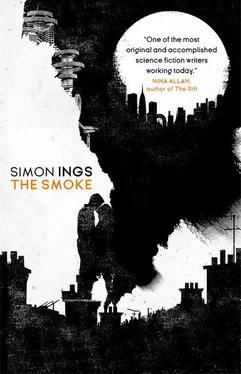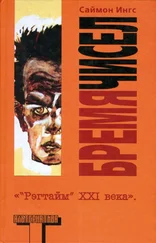I had just started my second year at the Bartlett, and was watching my first houses rise in Cripplegate, when Betty moved to Islington to stay with Stella. I didn’t visit often, and they did not encourage me. Chemotherapy left Betty weak, prone to viral infections of one sort or another. There was no prohibition on my visiting, but an odd reticence kept me away. If I phoned Stella at home in Islington, it was always to talk to my mother or, if she was resting, to ask after her. But when Stella and I met in person, it was never at the house, and the subject of Betty never arose.
Had I known my mum was going to spend the rest of her life in London, I would never have let such an unnatural state of affairs persist. But I always assumed that Betty would return to the West Riding after her treatment.
I wonder, at what point did Betty’s affection for Bob entirely die? He never, to my knowledge, behaved badly towards her, not even in his blackest moods, not even in his deepest drunk. She never had to hide behind lace curtains of a Monday morning, as I recall some bruised and battered neighbours doing.
Betty never went home. She spent her last years in a room not her own, in a city she didn’t know, being ministered to by a sister she loved dearly but with whom she had nothing in common. I realise now, and far too late, that she was disorientated. That she did not know what she was doing. That she did not know what she was agreeing to.
How long did Betty hide the symptoms of her cancer? She must have been aware of her illness even before I left for college. I remember when I was still at home, and distracted by the business of moving to London, she was constantly visiting the toilet. But this sort of thing seems significant only in retrospect. Once or twice I found pink piss in the toilet bowl. But even this is no smoking gun. With bladder cancer the bleeding stops and starts. It can disappear for weeks. Even months.
Whichever way you cut it, Betty’s silence killed her. Once in Islington, the pain in her lower back became so bad that Stella had to manhandle Betty to the surgery. It was the first time in her professional career that Stella had ever missed a matinee. Much later, she told me how startled she was at how light her sister had become: ‘Like a bundle of sticks.’
Had this medical emergency unfolded in the West Riding, I don’t doubt the doctor would have sent Betty away with painkillers and some nonsense about sleeping on a harder mattress.
In London it was a different story. Stella’s GP gave Betty an immediate referral.
The cystoscopy revealed suspicious lesions, too far gone to be removed surgically. Betty returned to Stella’s with a sore arm from a BCG injection and a letter for the GP to continue the course, but it was only ever a holding measure. Within the month she was back in hospital, an inpatient this time, awaiting an operation to remove her bladder.
It was the autumn of my second year, while I was having to commute daily from Tooting to Cripplegate. I suspect now that Mum’s operation was the main reason Fel and I moved in together when we did. Fel was worried about me.
‘There’s too much going on. You’ve too much to worry about. It’s going to drive you crazy.’
At the time, I was bowled over at the thought that Fel liked me enough to live with me. It never occurred to me, until later, how much she wanted to care for me.
I went to see Betty before the surgery. Her bed was a pile of forms, handbooks, diagrams. She was trying to understand what life would look like after the operation. She was confused, humiliated.
Further operations followed to create a new bladder for her, using a loop of intestine. She grew even thinner from that procedure, as was only to be expected. Released from hospital, she stayed with Stella, learning to self-catheterise, learning to live with incontinence.
She never went home. She never went back to my dad. She reminded me of those women of the Middle Ages who, disappointed in their political manoeuvrings, retire to a religious establishment.
And though it feels strange to me to be casting Aunt Stella, of all people, as a nurse, her performance was, as always, immaculate.
* * *
Why Stella did what she did then is still a mystery to me. And I can’t quite get it out of my head that she waited till I had spent a month in Shrophire, designing her precious TV show, before she dropped her bombshell on me.
‘It’s not the end of death,’ she tried to explain.
It had seemed strange to me at the time, that she had wanted to meet me so soon after our last teatime, when we had shared jokes about that strange meal in Windsor castle. It turned out that both occasions were of a piece: Stella was preparing me for what she had done.
Our sandwiches lay neglected on the silver tray and the tea grew cold in its pot. Had she really thought to lure me into an easy understanding? Was she so complacent? The hotel’s faux-Louis XV chair frame dug hard across the backs of my legs as I crouched forward, wanting to run, wanting to fight, wanting this not to be happening. Stella, for her part, must have guessed what my response would be: her shoulders were hunched, her whole manner defensive. ‘What it does,’ she explained, ‘is it obviates one’s personal extinction. Obviates. Is that a word?’
I had no idea what to say to her. What could you say to this? Georgy Chernoy’s patented Process was unprecedented. It was revolutionary. It was, frankly, bizarre. ‘For God’s sake, Stella. What were you thinking?’
‘She will not leave us. That’s what I’m trying to say. That what your mother is – and you have to think of her as a performance, Stuart, that’s the point, we’re not things, we’re performances, you see? We rehearse ourselves. Well, that rehearsal will continue.’
‘Does Dad know?’
Stella would not look at me.
‘You know he can stop this. Don’t you? He’s her husband. He has that right.’
She forced herself to meet my gaze. ‘We cannot let her die, Stuart. Can we? Think of the possibilities!’
When I got back to the Barbican, I was too upset to go up to the flat. I headed to the Foresters instead and used the payphone by the gents to call Bob’s pub, the Arms. I asked the barman to give my dad a shout and after a few minutes Bob called me from the usual payphone. ‘What is it?’ he said, assuming the worst. He had been preparing for this call for a while.
‘It’s Stella.’
That foxed him. ‘Stella?’
The pips sounded. ‘I’ll call you,’ I said.
I rang him back – we had called each other like this often enough that I knew the number – and I explained what Stella had done. I told him what she had planned for Betty. I couldn’t tell if the silence that followed indicated anger or confusion or grief or what. ‘Has Stella talked to you about this?’ I asked.
‘No,’ he replied. ‘She’s not spoken to me.’ This in a tone that would have told me, had I been paying attention, that it was quite pointless putting any responsibility for action onto him. Bob’s fear of confrontation was pathological. ‘I think this is Mum’s choice, don’t you?’ he said.
‘No,’ I said. ‘No, I don’t think this is Mum’s choice. I think Stella’s railroading her.’
‘Why would she do that?’
‘I don’t want a conversation about Stella. I want to talk to you about Mum. Will you come and see her, at least? Speak to her?’
Robert hummed and bumbled.
‘You can take a couple of days. The factory will give you a couple of days.’
‘But where will I stay?’
‘You can stay with Fel and me,’ I said, out of my mind with frustration.
Which left me having to explain to Fel why my father was visiting: because Stella had persuaded my mother to sign up for the Chernoy Process. The emotional complications of all this would surely drown us, so I decided to make a last-ditch effort and visit Medicine City myself, to see if I could dissuade Betty from undergoing the Process.
Читать дальше












